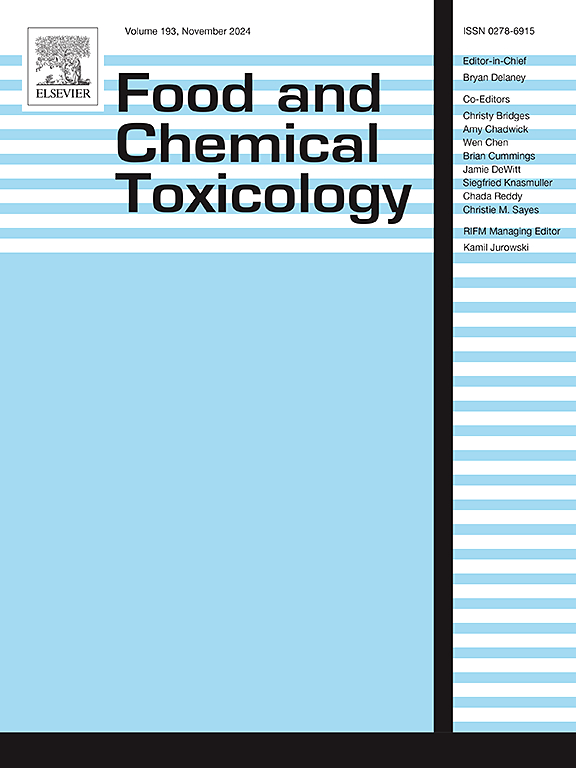MLIF inhibits inflammation and maintains intestinal flora homeostasis in a dextran sulfate sodium (DSS)-induced colitis mouse model
IF 3.9
3区 医学
Q2 FOOD SCIENCE & TECHNOLOGY
引用次数: 0
Abstract
Ulcerative colitis (UC) is a chronic inflammatory disease primarily affecting the colon, characterized by mucosal inflammation and ulceration. Monocyte locomotion inhibitory factor (MLIF), a heat-stable pentapeptide derived from Entamoeba histolytica, has demonstrated the anti-inflammatory capacity. The aim of the current work was to test the protective effects of MLIF in a dextran sulfate sodium (DSS)-induced colitis mouse model. Our findings indicated that MLIF significantly inhibition of colitis development, including body weight, DAI score, colon length, and spleen index. MLIF slowing the progression of inflammation in the colon of mice exposed to DSS, evidenced by HE staining and mRNA expression levels of Il1b, Il6, Il18 and Il10. MLIF significantly alleviated intestinal barrier dysfunction in mice exposed to DSS, evidenced by AB-PAS staining and mRNA expression levels of Tjp1, Ocln and Muc2. Importantly, the administration of MLIF in colitis mice exerted beneficial effects on the gut microbiota, enhancing microbial diversity and abundance, and promoting the restoration of gut microbiota homeostasis. Non-targeted metabolomics results suggest that the benefits of MLIF may arise from its modulation of tryptophan metabolism pathways. In conclusion, MLIF prevention inflammation induction and preserves intestinal homeostasis against colitis induced by DSS.
在葡聚糖硫酸钠(DSS)诱导的结肠炎小鼠模型中,MLIF抑制炎症并维持肠道菌群稳态。
溃疡性结肠炎(UC)是一种主要影响结肠的慢性炎症性疾病,其特征是粘膜炎症和溃疡。单核细胞运动抑制因子(MLIF)是一种热稳定的五肽,来源于溶组织内阿米巴,已被证明具有抗炎能力。目前的工作目的是测试MLIF在葡聚糖硫酸钠(DSS)诱导的结肠炎小鼠模型中的保护作用。我们的研究结果表明,MLIF显著抑制结肠炎的发展,包括体重、DAI评分、结肠长度和脾脏指数。通过HE染色和Il1b、Il6、Il18和Il10的mRNA表达水平证明,MLIF减缓了DSS暴露小鼠结肠炎症的进展。通过AB-PAS染色和Tjp1、Ocln和Muc2 mRNA的表达水平证实,MLIF可显著缓解DSS暴露小鼠肠道屏障功能障碍。重要的是,在结肠炎小鼠中给予MLIF对肠道微生物群有有益的影响,增加了微生物的多样性和丰度,促进了肠道微生物群稳态的恢复。非靶向代谢组学结果表明,MLIF的益处可能来自其对色氨酸代谢途径的调节。综上所述,MLIF可预防炎症诱导,并在DSS诱导的结肠炎中保持肠道稳态。
本文章由计算机程序翻译,如有差异,请以英文原文为准。
求助全文
约1分钟内获得全文
求助全文
来源期刊

Food and Chemical Toxicology
工程技术-毒理学
CiteScore
10.90
自引率
4.70%
发文量
651
审稿时长
31 days
期刊介绍:
Food and Chemical Toxicology (FCT), an internationally renowned journal, that publishes original research articles and reviews on toxic effects, in animals and humans, of natural or synthetic chemicals occurring in the human environment with particular emphasis on food, drugs, and chemicals, including agricultural and industrial safety, and consumer product safety. Areas such as safety evaluation of novel foods and ingredients, biotechnologically-derived products, and nanomaterials are included in the scope of the journal. FCT also encourages submission of papers on inter-relationships between nutrition and toxicology and on in vitro techniques, particularly those fostering the 3 Rs.
The principal aim of the journal is to publish high impact, scholarly work and to serve as a multidisciplinary forum for research in toxicology. Papers submitted will be judged on the basis of scientific originality and contribution to the field, quality and subject matter. Studies should address at least one of the following:
-Adverse physiological/biochemical, or pathological changes induced by specific defined substances
-New techniques for assessing potential toxicity, including molecular biology
-Mechanisms underlying toxic phenomena
-Toxicological examinations of specific chemicals or consumer products, both those showing adverse effects and those demonstrating safety, that meet current standards of scientific acceptability.
Authors must clearly and briefly identify what novel toxic effect (s) or toxic mechanism (s) of the chemical are being reported and what their significance is in the abstract. Furthermore, sufficient doses should be included in order to provide information on NOAEL/LOAEL values.
 求助内容:
求助内容: 应助结果提醒方式:
应助结果提醒方式:


